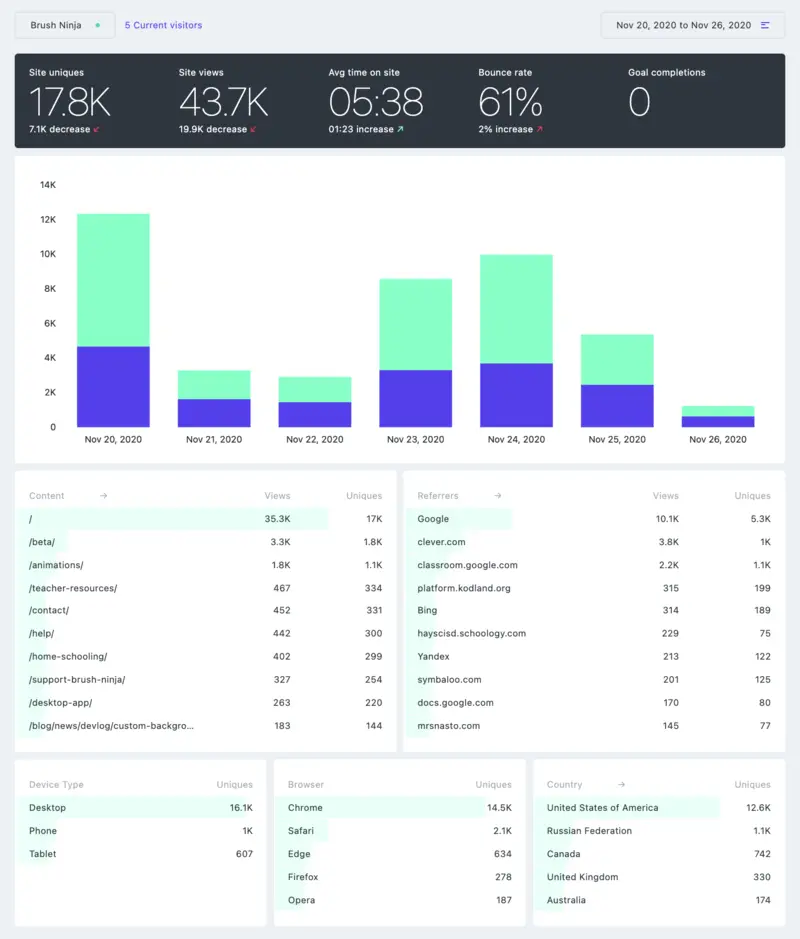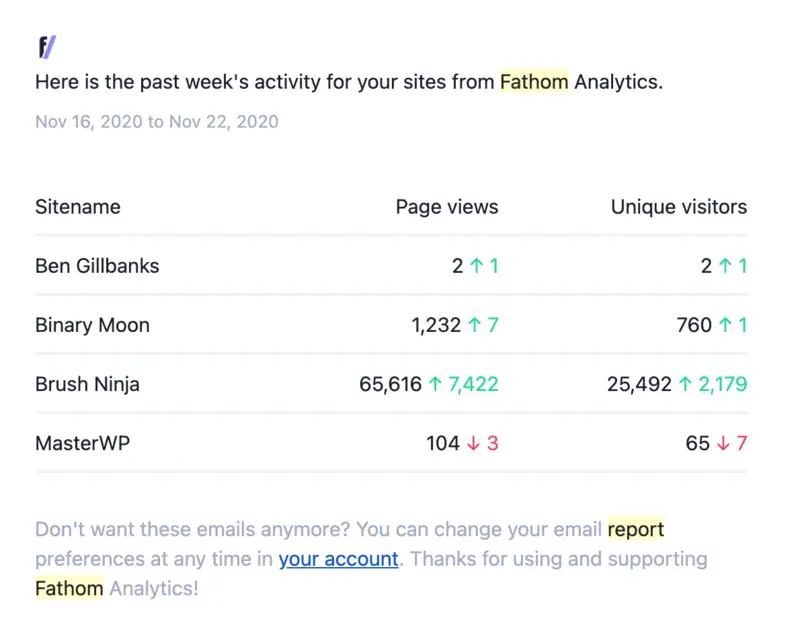Over the past few years, online privacy has become a significant concern, with companies like Facebook, Amazon, and Google being criticized for their tracking practices. The Cambridge Analytica scandal in particular has had a profound impact on people’s attitudes towards online privacy.
As a result, I have been focusing more on enhancing the privacy of users when developing software. I have taken various measures, such as removing Google fonts and tracking pixels from my projects. Additionally, I have switched to using a privacy-focused website analytics company called Fathom Analytics.
Fathom Analytics has been around for a couple of years and is operated by a small team of two individuals. Their objective is to render Google Analytics irrelevant through their efforts.

This article contains affiliate links to Fathom Analytics. By using these links, you can avail yourself of a free trial and receive $10 credit if you decide to try Fathom.
What about Google Analytics?
Google Analytics is widely regarded as the gold standard for website analytics due to its comprehensive data collection capabilities. However, it can be quite complex and challenging to navigate for those without extensive technical knowledge. Even locating basic metrics such as page views can be overwhelming.
While Google Analytics is highly beneficial for large businesses that require in-depth data analysis to drive decision-making processes, it tends to be excessive for small businesses. Small business owners often lack the time, resources, and expertise needed to fully utilize all that Google Analytics offers.
During my time working at Miniclip.com as part of the technical integration team responsible for implementing Google Analytics, I gained significant expertise in utilizing its advanced features. We employed unique strategies to track internal ad popularity and link clicks on our homepage. This involved configuring complex setups with event and goal tracking, which required constant tweaking and improvement.
As a premium Google Analytics partner, Miniclip had to pay a substantial annual fee due to the high volume of impressions generated. Despite the expense, it was still more cost-effective compared to building and maintaining an in-house analytics service for a company receiving hundreds of millions of monthly page views.
So why am I not using Google Analytics anymore?
The answer is simple: it’s overly complex, and it involves sharing user information with Google. By including Google scripts on every page (analytics, fonts, tag manager, etc.), Google can easily track almost all sites visited by logged-in users.
Small Businesses
For most small businesses—Fathom Analytics’ target audience—Google Analytics often exceeds their requirements in terms of functionality and complexity. These businesses typically prioritize knowing how many people visit their site, making traditional hit counters sufficient for their needs.

A screenshot of the Brush Ninja Analytics Dashboard
In my opinion, small businesses primarily need data on page views and referrers. While other metrics may also be useful, cafe owners or small woodworking companies generally lack the time, interest, or expertise to delve deeper into analytics. This is precisely where Fathom shines.
Fathom provides several essential statistics that offer valuable insights for making informed business decisions. Although Fathom’s feature set is not as extensive as that of Google Analytics, it covers key areas such as high-level page views overview, individual page views analysis, referrer data examination. Furthermore, there’s a toggle at the bottom of the page that grants access to additional information like device types, browsers used by visitors from different countries along with goal tracking capabilities.
More about Fathom
Apart from comprehensive stats analysis, Fathom also includes features such as website uptime monitoring, monthly and weekly email reports, and ‘hosted’ custom domains. The custom domains feature allows you to host Fathom’s tracking JavaScript on a subdomain of your website, making it more difficult for ad blockers to block the tracking. Moreover, since Fathom’s script is GDPR and privacy compliant, you don’t need to include any cookie consent scripts.

An example of a recent weekly Fathom stats email
Another noteworthy aspect of Fathom is their excellent customer support. Despite being a small team that handles every aspect of the business themselves, they genuinely care about their customers. I have personally reached out to their customer support on multiple occasions and both Jack and Paul have been exceptionally friendly and helpful in ensuring smooth operations.
Private Analytics
Fathom Analytics prioritizes user privacy. Various laws worldwide necessitate obtaining user consent before tracking their personally identifiable information. GDPR is perhaps the most well-known regulation in this regard, but similar laws exist in certain US states (such as California’s CCPA) and the UK (PECR). These regulations collectively aim to safeguard user privacy by restricting the tracking of personal data without explicit consent.
To comply with these regulations, Jack and Paul have devoted significant effort to ensure that Fathom does not require cookie consent notices or track any information that could identify individuals. All data collected by Fathom’s analytics remains anonymous and fully complies with data privacy laws. In fact, they have even developed a technique for entirely private session tracking that cannot be linked back to individual users.
Paid Analytics
Unfortunately, privacy comes at a cost—using Fathom Analytics requires a subscription fee. However, it’s important to consider that if you’re not paying for a service with money, you’re often paying in other ways, such as the sharing of user data, effectively turning the free service into a data collection tool. Paul and Jack work on Fathom Analytics full-time and need to support themselves financially.
I’ll be honest; I initially struggled with the idea of paying for analytics since I had grown accustomed to the free nature of Google Analytics. However, after transitioning to Fathom, I realized its value. While Google Analytics remained installed on my websites, I rarely used it. Nowadays, I rely on Fathom and regularly check the analytics provided by their platform—thanks in part to their engaging email updates.
Additionally, my concern for the privacy of my website visitors played a significant role in choosing Fathom as my preferred analytics solution. I want what is best for them, and privacy-focused analytics aligns perfectly with that goal.
When I started using Fathom initially, there was no free trial available which made it harder to gauge what to expect. However, now they offer public stats (such as my Brush Ninja ones), and you can enjoy a risk-free experience with their one-week free trial before committing to a paid plan.
Is It Perfect?
Almost! The only thing missing from Fathom’s feature set that would be beneficial to me personally is more detailed browser statistics like browser versions and screen sizes. This information would enable me to make more informed decisions regarding website design and construction. Nevertheless, overall satisfaction remains high. Also worth noting is that version 3 of Fathom is scheduled for release in November 2020 and promises additional features that may further enhance its offerings beyond what users currently anticipate.
Nowadays, I have an analytics solution that respects my visitors’ privacy and provides an enjoyable user experience.
TL;DR
- Fathom Analytics focuses on privacy, eliminating the need for cookie notices and avoiding invasive data tracking, unlike Google Analytics.
- Fathom offers easily understandable and usable website analytics.
- Fathom prioritizes visitor privacy, refraining from cross-site tracking, saving personal information, or relying on collected data for profitability.
- Fathom effectively handles high traffic volumes without sacrificing performance or discontinuing tracking due to popularity spikes.
- Fathom allows unlimited websites to be tracked and boasts exceptional customer support.
If you’re interested in trying out Fathom, you can sign up here. This link grants you a one-week free trial along with a $10 credit. Additionally, I will receive a small commission for referring you. It’s a win-win situation!
Was it good/ useful/ a load of old rubbish? Let me know on Mastodon, or BlueSky (or Twitter X if you must).
Link to this page
Thanks for reading. I'd really appreciate it if you'd link to this page if you mention it in your newsletter or on your blog.